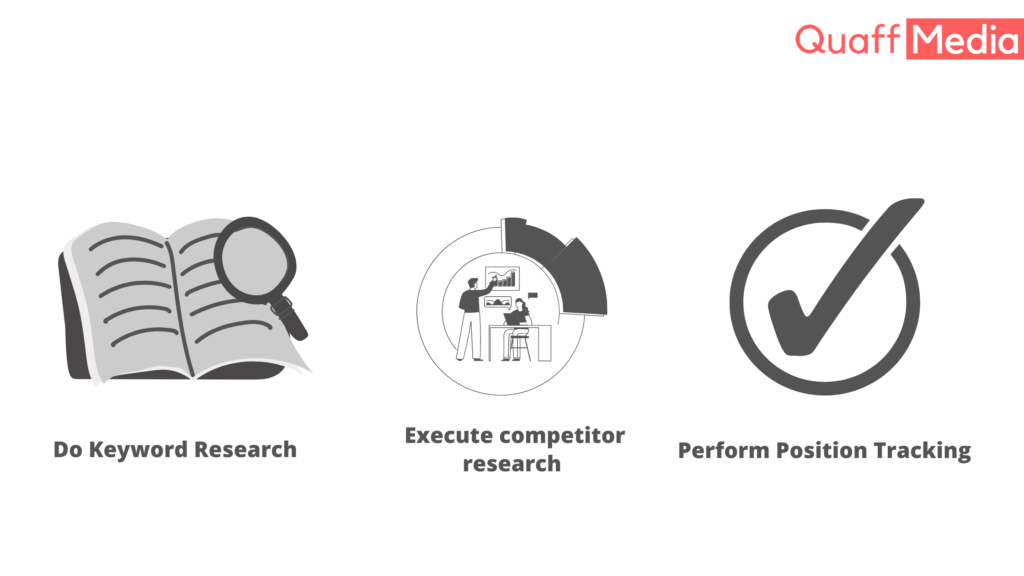Introduction
Search Engine Marketing can be one of the best ways of hitting the top position on SERPs. But for SEM, It is not only the big budget that would get you ranked, a good strategy is a foundational requirement for your SEM strategy to become a success.
For you to not spend big bucks on ad campaigns, we are here for your rescue. In this blog, we will discuss three ways you can leverage SEM to improve your ad campaigns.
But before we get into the tips, let’s first understand the meaning of Search Engine Marketing aka SEM
What is Search Engine Marketing (SEM)?
Search Engine Marketing or SEM is the practice in digital marketing that helps websites rank on SERPs.
Formerly, SEM was oriented to both organic and paid search activities but now it exclusively refers to paid search advertising.
You might have heard about pay-per-click (PPC). It is another name for search engine marketing.
So, now that you are familiar with SEM, let’s look into the three ways you can use SEM to improve your ad campaigns:
Three ways you can use SEM to improve your ad campaigns
1. If you face lower Clicks — Do Keyword Research
To create engaging ads and earn clicks, it’s important to understand your audience. The keywords you use in your SEM campaigns must reflect the user’s intent and identify whether they are cold, warm, or hot leads.
Google is very picky when it comes to showing ads. It won’t show ads to the searchers if the user’s keyword is not relevant, even if you had bid on them. Keyword research will help you have a list of keywords that Google likes and would love to rank on its SERPs. This will make your ad highly engaging since it is pushed up with google itself.
A great way of doing keyword tools is through the PPC keyword tool. This tool could be used to collect the keywords that you source from multiple places, such as CSV uploads and more tools in their package.
While dealing with your keyword research, It is important that you focus on keyword volume.
Keyword volume indicates the volume of searches for particular words per month. In the example above, the keyword “SEO agency” earned a total of 6,600 searches in the last month alone.
Keyword Volume means the number of searches for one keyword every month.
The keyword volume indicates how popular the keyword is. A more popular keyword also means it’s more competitive. It is important to check the competitive density of any keyword to see how competitive it can be for an SEM campaign.

2. Save your Bids from Competitors — Execute competitor research
Say after completing the whole process of campaign building, getting everything right, from the perfect budget to the right creatives, but still, you can’t see your ad in any SERP that you targeted. In this case, the probability is that your bids are getting beaten up by your competitors.
One of the best ways of getting a quality list of keywords is by keeping a check on your competitors’ strategies. With an effective competitive strategy, you find an opportunity of collecting the keywords that you might have missed before.
This is hands down a great way of staying on top of your SEM campaigns game and marketing standards.
The advertising research tool is an excellent tool to analyze your competitors’ keywords, competitive density, cost-per-click aka CPC, and more competitive stats.
Another cool keyword analysis tool that you can use is the Keyword Gap tool. This tool helps you identify your keyword wins and losses to your competitors. It is easy to follow and analyze. Keyword Gap tool helps you track how your organic, paid, and PLA keywords are doing.
It helps you find missing or irrelevant keywords in the Top Opportunities widget to identify the missing keywords from your overall keyword strategy. These might be the keywords that your competitors are targeting.
3. If you want better Performance Tracking — Perform Position Tracking
To keep updated with your SEM strategy, It is important to keep a track of your keywords position. It also helps you find if your rivals are ranking for your targeted keywords on SERPs.
Position tracking helps you determine if you need to restrategize your SEM strategy or address other issues on your website. Position tracking alerts you when your competitor ranks for your targeted keywords.
The Position Tracking tool makes the position tracking process easy by targeting it, so your decision is more information-driven.
Conclusion
With the right budget, SEM campaigns can bring out some really fruitful results. Do keyword research, analyze paid ad campaigns revolving around them, and create your planned and informed SEM campaign.

